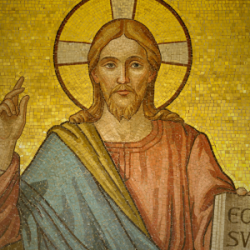THE MARKET, THE POOR, AND THE TWO PARTIES
As a young man working summer jobs, I learned an important lesson: always use the right tool for the job. At a day job in a warehouse, I needed to cut the plastic straps surrounding a sealed box so I could unpack a washing machine. I looked for something sharp, and found a screwdriver. That's sharp! So I began stabbing at the straps with the screwdriver. (I can see you wincing. I'm wincing too. Ah, youth!) Of course, I missed the straps, pieced the cardboard, and dented the appliance. Lesson learned: never use a tool for any purpose it was not designed to serve. If you do, you are sure to break something or hurt someone.
Government is a tool of God's design, and He gave it for a purpose: punishing evil and praising good. When we try to use it to do the good that it should only praise in others, wealth is destroyed and people are demoralized. We see the truth of that proposition working itself out in Europe where they have chosen the path of socialism, or social democracy, for the last sixty years. Now many of those countries find themselves with national debts the size of their annual gross domestic products, the total value of all the goods and services they produce in a year. There is a word for that: bankruptcy. (Basket case would be a less technical term.)
In America, Democrats, in their efforts to help people, are taking us down that European road of state provision. Government schools. School-provided lunches. School-provided breakfasts. School-provided abortions. Government financed student loans. Government control of all colleges and universities making use of student loans. Government home financing. Government engineered housing bubble. Government rescue from the resulting financial crisis. Government environmental protection, workplace safety standards, and multiple layers of bureaucratic intrusion that drive your employer out of business. Government unemployment insurance. Government old age pension. Government medical care for the elderly. Government medical care for the poor. Government medical care for everybody. The I.R.S. to make sure that ten percent of the country is paying for all of this.
But though we may bankrupt ourselves paying for these programs and for an ever-expanding class of free riders whom the political class is happy to take on as clients, surely we at least have the moral satisfaction of knowing that we are a compassionate society. But no, we lose that too.
Government charity (a contradiction in terms) wicks the charity out of the people themselves. As government assumes increasingly more responsibility for charitable work, private citizens come to feel increasingly less inclination, and recognize increasingly less responsibility, for it. Advocates of government charity then point to this private inactivity as justification for evermore expanded activity in this field.
Again, look at Europe. They have a generous welfare state that provides a far wider array of social services than ours does in America. In the Netherlands, the government provides parents with a stipend to feed and clothe their children. Why should parents feed and clothe their own children? And what about the aged? No problem. If your mother has arthritis, the government will send someone over to fix her faucets and change all the handles on her doors. Why should her children bother themselves with such things?
A friend of mine who left the Netherlands twenty years ago but who still has family there, including his aged mother, tells me that, precisely because of the generosity and even the efficiency of government provision, people have become personally unmindful of the needy. Even within families, personal relations are colder, he says, more businesslike. The Dutch have decided that a good society is a compassionate society, and so people should provide for one another's dignity and basic quality of life—but only through the state. People needn't actually have anything to do with one another directly.
The American political left is eagerly working to make our country more like Europe.32 They see our individualism as selfish and immoral, and they view reliance on private charity as ineffective and degrading in comparison to government services and entitlements. The lesson of the Dutch experience, however, is not that the welfare state is the defining feature of a compassionate society, but that our choice in providing for the helpless and suffering is between the nanny state and a caring citizenry.33
The Christian moral objection to the welfare state is not only that it corrupts the character of those who otherwise would have responsibility for giving, but also that it violates the eighth commandment. One of government's fundamental tasks is to protect people in their property. "Thou shalt not steal." God instituted government in part to protect people against being despoiled by their neighbors. Man being sinful, there will always be some who would rather take the fruit of someone else's labor than labor on their own. Theft, in that regard, is a kind of slavery. It forces the victim against his will to work for the thief.




